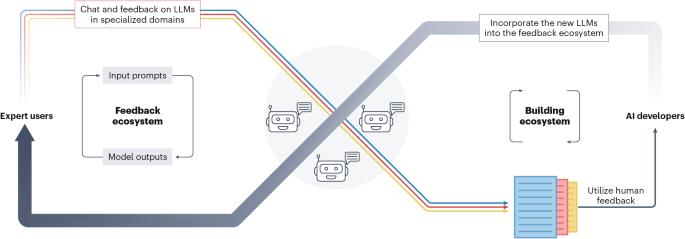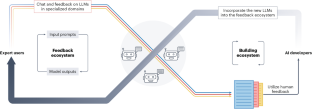The future of open human feedback
IF 23.9
1区 计算机科学
Q1 COMPUTER SCIENCE, ARTIFICIAL INTELLIGENCE
引用次数: 0
Abstract
Human feedback on conversations with language models is central to how these systems learn about the world, improve their capabilities and are steered towards desirable and safe behaviours. However, this feedback is mostly collected by frontier artificial intelligence labs and kept behind closed doors. Here we bring together interdisciplinary experts to assess the opportunities and challenges to realizing an open ecosystem of human feedback for artificial intelligence. We first look for successful practices in the peer-production, open-source and citizen-science communities. We then characterize the main challenges for open human feedback. For each, we survey current approaches and offer recommendations. We end by envisioning the components needed to underpin a sustainable and open human feedback ecosystem. In the centre of this ecosystem are mutually beneficial feedback loops, between users and specialized models, incentivizing a diverse stakeholder community of model trainers and feedback providers to support a general open feedback pool. Don-Yehiya et al. explore creating an open ecosystem for human feedback on large language models, drawing from peer-production, open-source and citizen-science practices, and addressing key challenges to establish sustainable feedback loops between users and specialized models.


开放人类反馈的未来
人类对与语言模型对话的反馈对于这些系统如何了解世界、提高能力并引导其做出理想和安全的行为至关重要。然而,这些反馈大多是由前沿人工智能实验室收集的,并且是闭门不出的。在这里,我们汇集了跨学科的专家来评估实现人工智能人类反馈的开放生态系统的机遇和挑战。我们首先在同行生产、开源和公民科学社区寻找成功的实践。然后,我们描述了开放人类反馈的主要挑战。对于每种方法,我们都会调查当前的方法并提供建议。最后,我们设想了支撑可持续和开放的人类反馈生态系统所需的组件。在这个生态系统的中心是用户和专业模型之间的互利反馈循环,激励模型培训师和反馈提供者组成的不同利益相关者社区支持一个通用的开放反馈池。
本文章由计算机程序翻译,如有差异,请以英文原文为准。
求助全文
约1分钟内获得全文
求助全文
来源期刊

Nature Machine Intelligence
Multiple-
CiteScore
36.90
自引率
2.10%
发文量
127
期刊介绍:
Nature Machine Intelligence is a distinguished publication that presents original research and reviews on various topics in machine learning, robotics, and AI. Our focus extends beyond these fields, exploring their profound impact on other scientific disciplines, as well as societal and industrial aspects. We recognize limitless possibilities wherein machine intelligence can augment human capabilities and knowledge in domains like scientific exploration, healthcare, medical diagnostics, and the creation of safe and sustainable cities, transportation, and agriculture. Simultaneously, we acknowledge the emergence of ethical, social, and legal concerns due to the rapid pace of advancements.
To foster interdisciplinary discussions on these far-reaching implications, Nature Machine Intelligence serves as a platform for dialogue facilitated through Comments, News Features, News & Views articles, and Correspondence. Our goal is to encourage a comprehensive examination of these subjects.
Similar to all Nature-branded journals, Nature Machine Intelligence operates under the guidance of a team of skilled editors. We adhere to a fair and rigorous peer-review process, ensuring high standards of copy-editing and production, swift publication, and editorial independence.
 求助内容:
求助内容: 应助结果提醒方式:
应助结果提醒方式:


